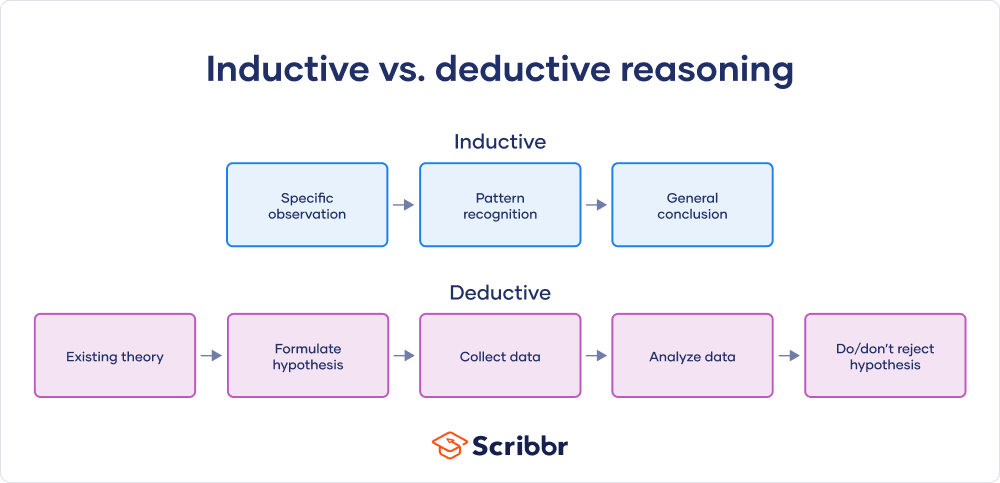The main difference between inductive and deductive reasoning is that inductive reasoning aims at developing a theory while deductive reasoning aims at testing an existing theory.
Inductive reasoning moves from specific observations to broad generalizations, and deductive reasoning the other way around.
Both approaches are used in various types of research, and it’s not uncommon to combine them in one large study.

Inductive research approach
When there is little to no existing literature on a topic, it is common to perform inductive research because there is no theory to test. The inductive approach consists of three stages:
- Observation
- A low-cost airline flight is delayed
- Dogs A and B have fleas
- Elephants depend on water to exist
- Observe a pattern
- Another 20 flights from low-cost airlines are delayed
- All observed dogs have fleas
- All observed animals depend on water to exist
- Develop a theory or general (preliminary) conclusion
- Low cost airlines always have delays
- All dogs have fleas
- All biological life depends on water to exist
Limitations of an inductive approach
A conclusion drawn on the basis of an inductive method can never be proven, but it can be invalidated.
Example
You observe 1000 flights from low-cost airlines. All of them experience a
delay, which is in line with your theory. However, you can never prove
that flight 1001 will also be delayed. Still, the larger your dataset,
the more reliable the conclusion.
Deductive research approach
When conducting deductive research, you always start with a theory (the result of inductive research). Reasoning deductively means testing these theories. If there is no theory yet, you cannot conduct deductive research.
The deductive research approach consists of four stages:
- Start with an existing theory (and create a problem statement)
- Low cost airlines always have delays
- All dogs have fleas
- All biological life depends on water to exist
- Formulate a falsifiable hypothesis based on existing theory
- If passengers fly with a low cost airline, then they will always experience delays
- All pet dogs in my apartment building have fleas
- All land mammals depend on water to exist
- Collect data to test the hypothesis
- Collect flight data of low-cost airlines
- Test all dogs in the building for fleas
- Study all land mammal species to see if they depend on water
- Analyze and test the data
- 5 out of 100 flights of low-cost airlines are not delayed
- 10 out of 20 dogs didn’t have fleas
- All land mammal species depend on water
- Decide whether you can reject the null hypothesis
- 5 out of 100 flights of low-cost airlines are not delayed = reject hypothesis
- 10 out of 20 dogs didn’t have fleas = reject hypothesis
- All land mammal species depend on water = support hypothesis
Limitations of a deductive approach
The conclusions of deductive reasoning can only be true if all the premises set in the inductive study are true and the terms are clear.
Example
- All dogs have fleas (premise)
- Benno is a dog (premise)
- Benno has fleas (conclusion)
Based on the premises we have, the conclusion must be true. However, if the first premise turns out to be false, the conclusion that Benno has fleas cannot be relied upon.
Combining inductive and deductive research
Many scientists conducting a larger research project begin with an inductive study (developing a theory). The inductive study is followed up with deductive research to confirm or invalidate the conclusion.
In the examples above, the conclusion (theory) of the inductive study is also used as a starting point for the deductive study.
Source: www.scribbr.com